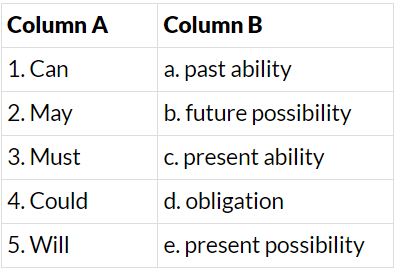Modals Class 6 Worksheet English Grammar
Instructions
- For MCQs, choose the best option and write the corresponding letter in your answer sheet.
- For short questions, answer in a complete sentence.
- For fill in the blanks, write the appropriate word.
- For the match the column section, draw lines connecting the correct pairs.
- For true/false, write 'T' if the statement is true and 'F' if the statement is false.
- Answer all questions within the word limit mentioned in each section.
Section - A
Q.1. Multiple Choice Questions [1 mark each]
(i) Which of the following is an example of a modal verb?
(a) am
(b) can
(c) walk
(d) drink
Correct Answer is Option (b)
Explanation:
- Modal verbs are auxiliary verbs that express necessity, possibility, permission, or ability.
- "Can" fits this category, while "am," "walk," and "drink" do not.
(ii) The modal verb 'must' is used to express:
(a) possibility
(b) obligation
(c) permission
(d) ability
Correct Answer is Option (b)
Explanation:
- Must conveys strong necessity or duty, such as "You must wear a uniform.
(iii) Which of the following is not a modal verb?
(a) should
(b) could
(c) was
(d) might
Correct Answer is Option (c)
Explanation:
- Modal verbs include "should", "could," and "might."
- "Was" is a form of the verb, not a modal.
(iv) Which modal verb is used to show a past ability?
(a) can
(b) could
(c) will
(d) might
Correct Answer is Option (b)
Explanation:
- Could is used to describe abilities someone had in the past, such as “She could swim when she was five.
(v) Which of the following sentences is correct?
(a) He might plays football.
(b) She must to go home.
(c) They can swim.
(d) I would eats pizza.
Correct Answer is Option (c)
Explanation:
- The other sentences have incorrect grammar, such as extra words ("must to") or incorrect verb forms ("might plays").
Q.2. Short Questions [2 marks Each]
(i) What are modal verbs? Give two examples.
Modal verbs are auxiliary verbs that express necessity, possibility, permission, or ability. Examples: can, should.
(ii) What is the difference between 'can' and 'could'?
'Can' is used to express present ability or possibility, while 'could' is used to express past ability or possibility.
(iii) Explain the use of 'may' and 'might' in sentences.
'May' and 'might' are both used to express possibility, but 'may' is more certain than 'might'.
(iv) When should we use 'should' and 'must' in a sentence?
'Should' is used to give advice or suggestions, whereas 'must' is used to express a strong obligation or necessity.
Section - C
Q.3. Fill in the blanks [1 mark each]
(i) You ________ (can/could) play outside after finishing your homework.
can
(ii) I ________ (may/might) go to the party tonight, but I'm not sure yet.
may
(iii) They ________ (must/should) wear a helmet while riding a bike.
must
(iv) She ________ (can/could) speak three languages when she was younger.
could
(iv) We ________ (would/will) like to visit Paris someday.
would
 |
Download the notes
Worksheet Solutions: Modals
|
Download as PDF |
Section - D
Q.4. Match the column [1 mark each]

1. Can - c. present ability
2. May - e. present possibility
3. Must - d. obligation
4. Could - a. past ability
5. Will - b. future possibility
Section - E
Q.5. True/False [1 mark each]
(i) Modal verbs are always followed by the base form of the verb.
True
(ii) 'Would' is used to express past ability.
False
(iii) 'Should' is used to give advice or suggestions.
True
(iv) 'Might' is used to express strong obligation.
False
(v) We can use 'can' to ask for and give permission.
True
|
48 videos|261 docs|45 tests
|

















